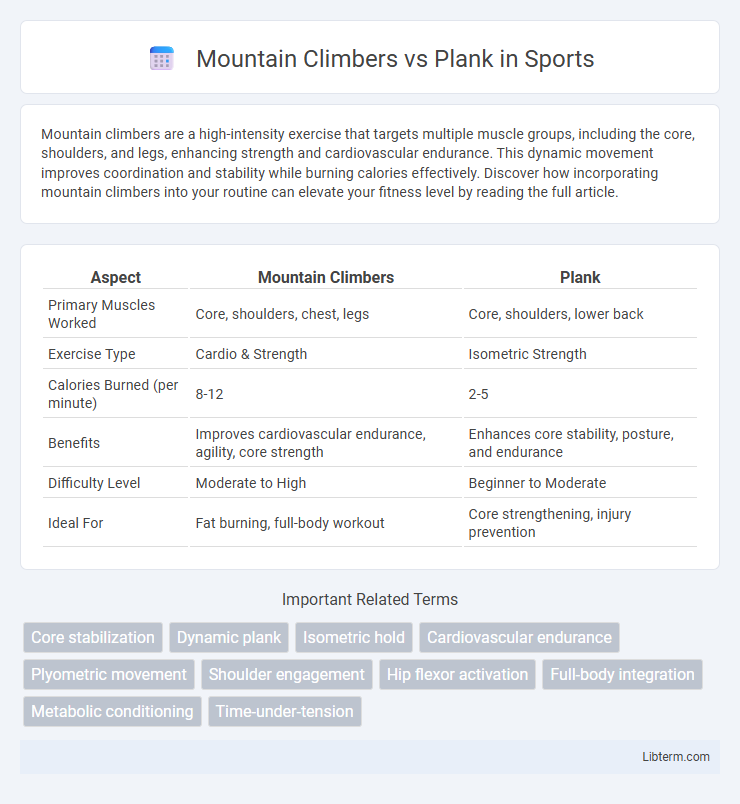Mountain climbers are a high-intensity exercise that targets multiple muscle groups, including the core, shoulders, and legs, enhancing strength and cardiovascular endurance. This dynamic movement improves coordination and stability while burning calories effectively. Discover how incorporating mountain climbers into your routine can elevate your fitness level by reading the full article.
Table of Comparison
| Aspect | Mountain Climbers | Plank |
|---|---|---|
| Primary Muscles Worked | Core, shoulders, chest, legs | Core, shoulders, lower back |
| Exercise Type | Cardio & Strength | Isometric Strength |
| Calories Burned (per minute) | 8-12 | 2-5 |
| Benefits | Improves cardiovascular endurance, agility, core strength | Enhances core stability, posture, and endurance |
| Difficulty Level | Moderate to High | Beginner to Moderate |
| Ideal For | Fat burning, full-body workout | Core strengthening, injury prevention |
Introduction to Mountain Climbers and Plank
Mountain Climbers and Planks are fundamental bodyweight exercises targeting core strength and stability. Mountain Climbers engage multiple muscle groups including the core, shoulders, and legs while enhancing cardiovascular endurance through a dynamic, high-intensity movement. Planks primarily focus on isometric contraction of the abdominal muscles, back, and shoulders, providing a solid foundation for core stability and improved posture.
Core Muscle Activation: Mountain Climbers vs Plank
Mountain climbers engage the core muscles dynamically by activating the rectus abdominis, obliques, and transverse abdominis during continuous movement, which enhances muscular endurance and cardiovascular fitness. Planks provide static core stabilization, targeting the deep core muscles, including the transverse abdominis and multifidus, promoting spinal alignment and isometric strength. Comparing core muscle activation, mountain climbers offer higher engagement through dynamic contraction, while planks emphasize sustained muscle tension for stability.
Calorie Burn Comparison
Mountain climbers burn approximately 10-15 calories per minute, engaging multiple muscle groups for a high-intensity cardio workout. In contrast, planks primarily focus on core stabilization and burn about 2-5 calories per minute due to their isometric nature. For effective calorie burn, incorporating mountain climbers into a routine is more efficient than holding plank positions alone.
Cardiovascular Benefits
Mountain climbers significantly enhance cardiovascular endurance by elevating heart rate through dynamic, full-body movement that engages multiple muscle groups. Planks primarily strengthen the core and improve muscular endurance but offer limited cardiovascular benefits due to their static nature. Incorporating mountain climbers into a routine can boost aerobic capacity and promote heart health more effectively than planks alone.
Strength and Endurance Gains
Mountain climbers engage multiple muscle groups, including the core, shoulders, and legs, boosting cardiovascular endurance while enhancing dynamic strength. Planks primarily target isometric strength in the core, shoulders, and back, improving muscular endurance and stability. Combining mountain climbers and planks maximizes overall functional strength and endurance development.
Impact on Flexibility and Mobility
Mountain climbers enhance dynamic flexibility by actively engaging hip flexors, hamstrings, and core muscles through continuous movement patterns, improving joint mobility and coordination. Planks primarily target static core strength and stability, providing minimal direct impact on dynamic flexibility but promoting better posture and spinal alignment. Integrating mountain climbers into workouts can significantly boost functional mobility, while planks support foundational strength crucial for maintaining flexibility gains.
Suitability for Different Fitness Levels
Mountain Climbers offer a dynamic, high-intensity workout suitable for advanced fitness levels due to their cardio and core engagement, making them ideal for those seeking to improve endurance and agility. In contrast, Planks provide a static hold that effectively builds core strength and stability with low impact, making them accessible and beneficial for beginners and individuals with joint concerns. Both exercises can be modified in duration and intensity to accommodate varying fitness levels, ensuring a tailored approach to core conditioning.
Injury Risk and Safety Considerations
Mountain climbers engage dynamic, high-impact movements that increase the risk of wrist and shoulder strain, especially with improper form or inadequate warm-up. Planks emphasize static core stabilization, reducing joint stress and lowering the likelihood of injury when performed correctly. Prioritizing proper technique, gradual progression, and listening to body signals are crucial for minimizing injury risk in both exercises.
Variations and Progressions
Mountain climbers offer dynamic variations such as cross-body, slow-motion, and spider climbers, targeting core, cardio, and hip flexors with scalable intensity. Plank progressions include forearm planks, side planks, plank taps, and plank with leg lifts, enhancing stability, shoulder strength, and oblique activation. Both exercises can be intensified by increasing duration, adding weights, or incorporating unstable surfaces for advanced core engagement and overall functional fitness.
Choosing the Right Exercise for Your Goals
Mountain climbers target cardiovascular endurance and core strength simultaneously, making them ideal for fat loss and dynamic full-body workouts. Planks emphasize static core stabilization, improving posture and enhancing muscle endurance without high-impact movement. Selecting the right exercise depends on your fitness goals: opt for mountain climbers to boost calorie burning and agility, or choose planks to build foundational core stability and prevent injuries.
Mountain Climbers Infographic

 libterm.com
libterm.com